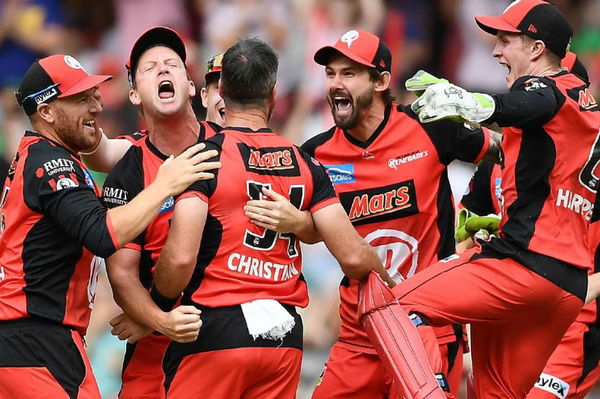
via Imago
Melbourne Renegades

via Imago
Melbourne Renegades
The ninth edition of Big Bash League (BBL) will see a couple of changes in their schedule. The new leagues will begin from December 17 where eight teams will play 56 games. Unlike last year, the league will end within 42 days. Due to that more double-headers will be seen.
Along with this, the format of the final has also changed. Five teams will be featured in the finals with a new format that will give a double-chance for the top two teams. On the other hand, the fourth and fifth-placed teams will play “The Eliminator” which is newly added in the format with the winner will take on the third-placed team in “The Knock-Out”.
Teams who will finish first and the second position, play “The Qualifier” whereas the team who will lose, face the winner of “The Knock Out” in “The Challenger”. The Final will be played between the Challenger and Qualifier winners. All finals will be played at night, with the exception of the games which will be played in Perth.
ADVERTISEMENT
Article continues below this ad
“We’ve listened and now have a shortened fixture, more consistent timeslots, a continued regional footprint and a stronger finals format which will give fans the best opportunity to experience the BBL,” Alistair Dobson, the BBL head of leagues said.
“The finals format has been set to make it the best possible end to the season, rewarding the top two teams with a double chance and giving the winner hosting rights of The Final,” he further added. “At the same time, it’s a more challenging and entertaining prospect for fourth and fifth to go on and win the competition.”
However, fans feedback, pressure from broadcasters and clubs, low attendances and a constant low rating on television has resulted in these changes in the upcoming league.

via Imago
Big Bash League will see a shorter format. ©Cricket Australia
The new head of the BBL, Alistair Dobson, said the finals revamp was the most important feature of the new fixture.
“The No. 1 element is to make it the best chance for the teams finishing first and second to make it through,” Dobson told. “It’s an amazing quirk of history that the team finishing first at the end of the season has only won it once and the team finishing third or fourth has for some reason won it more often.”
“So we want to reward the teams finishing first and second as well as we can. There is an element though of making the finals more accessible for the fans, and this model also gives us a chance for the team hosting the final to have more preparation going in,” he said.
ADVERTISEMENT
Article continues below this ad
“[There has been] lots of chatter about it,” Dobson expressed. “It was an amazing game. If we could have a BBL season that could end with a tie and Super Over, it would be a great way to finish. It’s available to be discussed with the clubs. We haven’t locked it in either way. At the moment it’s a similar finish to what we saw at the World Cup and we’ll work through that over the next period of time,” he further said.
“The league and the clubs will collaboratively work on that alongside our broadcasters and there’s a whole range of stakeholders we’ll have to consult on that,” he concluded.
Melbourne Renegades, led by Aaron Finch won the 2018-19 title, beating the Stars. Brisbane Heat will start this year’s league against Sydney Thunder. In between the league, Australia will tour to India for a three-match ODI series in January as well.
ADVERTISEMENT
Article continues below this ad
BBL finals structure:
January 30: The Eliminator – 4th v 5th
January 31: The Qualifier – 1st v 2nd
February 1: The Knockout – 3rd v Winner of Eliminator
February 6: The Challenger – Loser of Qualifier v Winner of Knockout
February 8: Final – Winner of Qualifier v Winner of Challenger

